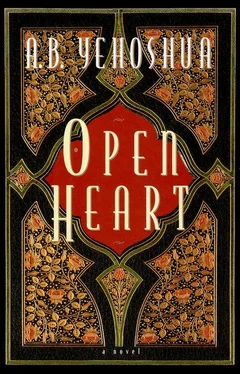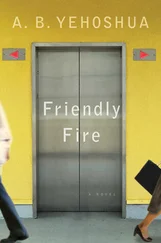A. Yehoshua - Open Heart
Здесь есть возможность читать онлайн «A. Yehoshua - Open Heart» весь текст электронной книги совершенно бесплатно (целиком полную версию без сокращений). В некоторых случаях можно слушать аудио, скачать через торрент в формате fb2 и присутствует краткое содержание. Год выпуска: 2014, Издательство: Peter Halban, Жанр: Современная проза, на английском языке. Описание произведения, (предисловие) а так же отзывы посетителей доступны на портале библиотеки ЛибКат.
- Название:Open Heart
- Автор:
- Издательство:Peter Halban
- Жанр:
- Год:2014
- ISBN:нет данных
- Рейтинг книги:3 / 5. Голосов: 1
-
Избранное:Добавить в избранное
- Отзывы:
-
Ваша оценка:
- 60
- 1
- 2
- 3
- 4
- 5
Open Heart: краткое содержание, описание и аннотация
Предлагаем к чтению аннотацию, описание, краткое содержание или предисловие (зависит от того, что написал сам автор книги «Open Heart»). Если вы не нашли необходимую информацию о книге — напишите в комментариях, мы постараемся отыскать её.
Open Heart — читать онлайн бесплатно полную книгу (весь текст) целиком
Ниже представлен текст книги, разбитый по страницам. Система сохранения места последней прочитанной страницы, позволяет с удобством читать онлайн бесплатно книгу «Open Heart», без необходимости каждый раз заново искать на чём Вы остановились. Поставьте закладку, и сможете в любой момент перейти на страницу, на которой закончили чтение.
Интервал:
Закладка:
That evening the snowstorm intensified, but I went anyway to visit Eyal, a childhood friend who had studied medicine with me, and who was on call tonight in Hadassah Hospital, where he was doing his residency in pediatrics, after having been turned down by the surgical department. We sat in a little room with pictures of children stuck up on the walls, surrounded by the racket of sick children running up and down the corridor pursued by their harassed parents. We drank tepid tea from plastic cups and as usual compared conditions in our respective hospitals before discussing anything else. Then he asked me about my trip to India, of which he had already heard about from my mother, and at the sight of his friendly eyes fixed on mine, I felt an impulse to tell him immediately about the most important thing that had happened to me on the trip. I thought that Eyal, who had been living with his widowed mother for the past few years, would understand better than most people. But at the last moment I stopped myself. I had plenty of time; this wasn’t the right moment. And I began telling him about the medical aspects of the trip. He was very impressed by the night flight to Calcutta with the blood and urine samples, but seemed doubtful about the blood transfusion I had performed in Varanasi. “I hope that in your enthusiasm you didn’t infect the mother with the daughter’s virus,” he said with a smile. “Nonsense,” I replied, “how could I have infected her? I was careful to place her higher than the patient too.”
“That doesn’t make much difference,” he said knowingly, “but there’s no use crying over spilled milk. The main thing is for you not to lose touch with this Lazar — and don’t take any money from him, so he’ll remain in your debt and maybe he’ll influence Hishin to let you have another year in his department.” While Eyal was showering me with practical advice, he was urgently summoned to the emergency room to examine a young boy who had tried to kill himself. It was late, but I was curious to see how they would manage the case. The patient was about thirteen, tall for his age, jerking violently under the hands of the nurses brutally pumping his stomach. Since I was wearing civilian clothes, they took me for his brother or some other relative and kept ordering me out of the little treatment cubicle. In the end I decided to leave in spite of my curiosity. Eyal, who had thought that I was going to spend the night keeping him company, suggested that I postpone my return to Tel Aviv and come to lunch at his house the next day. I hesitated. The commotion of the Hadassah emergency room made me homesick for my own hospital. But Eyal began urging me through the curtain separating us, holding on firmly to the arm of the boy, who had already begun spewing out the sleeping pills through the thick tube which had been inserted into his stomach. “Come on, you have to come — I’ve got an amazing story for you.”
“What story?” I asked suspiciously, unwilling to commit myself. “You won’t believe it, but I’m getting married,” he announced loudly and shamelessly to the frightened, unhappy people filling the emergency room.
The road from Ein Kerem back to town was very clear now; the crowns of snow on the branches of the trees and the rocks at the roadside lent a new magic to the night, and I was cheered by the thought that after lunch tomorrow, in exchange for the story of the wedding, I might gather the courage to tell Eyal about my own unexpected falling in love. Why not? If not Eyal, who would be able to understand me? My mother was waiting up for me, sitting in the dark in the living room in her old woolen robe. “It’s because of the snow, only because of the snow on the roads,” she apologized, and immediately got up to make us a cup of tea. “I already had tea with Eyal in the hospital,” I announced, and made for my room, refusing to linger and risk a nocturnal interrogation. And as she retired, disappointed, to her bedroom, I caught a glimpse through the door of my parents’ beds standing in an L-shape under the two moonlit windows. “You won’t believe it, Mother,” I blurted out in a whisper, “Eyal’s getting married.”
“Why shouldn’t I believe it?” she cried. “It’s high time. For his friends too.” And my father poked his head out of the blankets and chuckled. “You’re opening a battlefront in the middle of the night.” But my mother had already calmed down, and she only asked curiously about the bride. “I didn’t have a chance to hear,” I said, “but tomorrow I’m going there for lunch, and maybe I’ll even see her.”
“So you’re staying tomorrow too,” said my mother with a certain relief. Even if I wasn’t getting married, at least I was staying with them for one more day.
When we were both students at the hospital, I often ate at Eyal’s place, because we preferred studying in his house, which was big and quiet. His mother, who lived alone, didn’t like being by herself in the house at night, and she would cook up tasty meals to ensure that we always studied there. She was a sad woman, with some of her former beauty left, and she liked talking to me in English, since she was hoping to find work in the tourist bureau. From time to time she received visits from middle-aged men, but she refused to become involved with any of them. Now the two of them sat looking politely at the photographs of my trip. “A pretty girl, but obviously neurotic,” Eyal said, dismissing Einat. “I doubt if she’s worth investing in.” He went on to study Lazar’s broad face with evident enjoyment. “It’s obvious,” he pronounced, “that he’s a strong man, but also friendly and humane. If you’ve already become close to him and his family, it would be a shame to lose that.”
“His wife’s very nice too,” I said suddenly, and felt myself blushing. Eyal examined the snapshots again. “Yes, she’s always smiling,” he agreed. “You can see at once that she’s pleased with herself.” I was so delighted by these perceptive words that I wanted to go on talking about her. But his sad mother, who had grown very fat lately, didn’t want to leave us alone together. “Are you glad that Eyal’s getting married?” I asked her carefully. “She’s overjoyed,” Eyal answered for her. His mother said nothing, and after a pause she asked if we were ready for lunch. Eyal suggested that we wait for his girlfriend, who was due to arrive soon.
But his mother said the food would get cold, and in a surly tone, which I had never heard her use before, she demanded that we eat right away. And then, when we sat down opposite each other at the elegantly laid table and she disappeared into the kitchen, I lowered my eyes and said with a miserable smile, “You’re suddenly getting married, and I, I don’t know what’s happening to me, but I’ve suddenly fallen in love with a married woman.”
“A married woman?” Eyal’s little eyes filled with a sly smile, which showed that my frank statement hadn’t taken him by surprise. “Yes, a married woman.” I nodded my head sadly. “Don’t tell me that you’re talking about the director’s wife,” Eyal said, looking at me with a pitying smile. “Lazar’s wife?” I laughed in astonishment. “What an idea!” And I immediately went on, “Can you really see me falling in love with a woman twenty years older than me?” But Eyal did not seem put out by my indignant protests. He shrugged his shoulders and went on smiling. “I didn’t mean anything — it doesn’t matter. It’s just that I saw you couldn’t stop taking pictures of her, and besides, she really does look nice. But it doesn’t matter. If not her, then who have you fallen in love with? And what’s more important, who’s she married to?” But at this point his mother returned and set two bowls of soup carefully before us, after which she sat down beside us and placed her beautiful white hands on the table. “Aren’t you eating with us?” I asked her sympathetically. “No,” she said hesitantly, “I’m not hungry,” and her face, which was turned to her son, grew very red. Eyal reached out, laid his hand gently on her shoulder, and said affectionately, “Yes, Mother has to watch her weight.”
Читать дальшеИнтервал:
Закладка:
Похожие книги на «Open Heart»
Представляем Вашему вниманию похожие книги на «Open Heart» списком для выбора. Мы отобрали схожую по названию и смыслу литературу в надежде предоставить читателям больше вариантов отыскать новые, интересные, ещё непрочитанные произведения.
Обсуждение, отзывы о книге «Open Heart» и просто собственные мнения читателей. Оставьте ваши комментарии, напишите, что Вы думаете о произведении, его смысле или главных героях. Укажите что конкретно понравилось, а что нет, и почему Вы так считаете.












